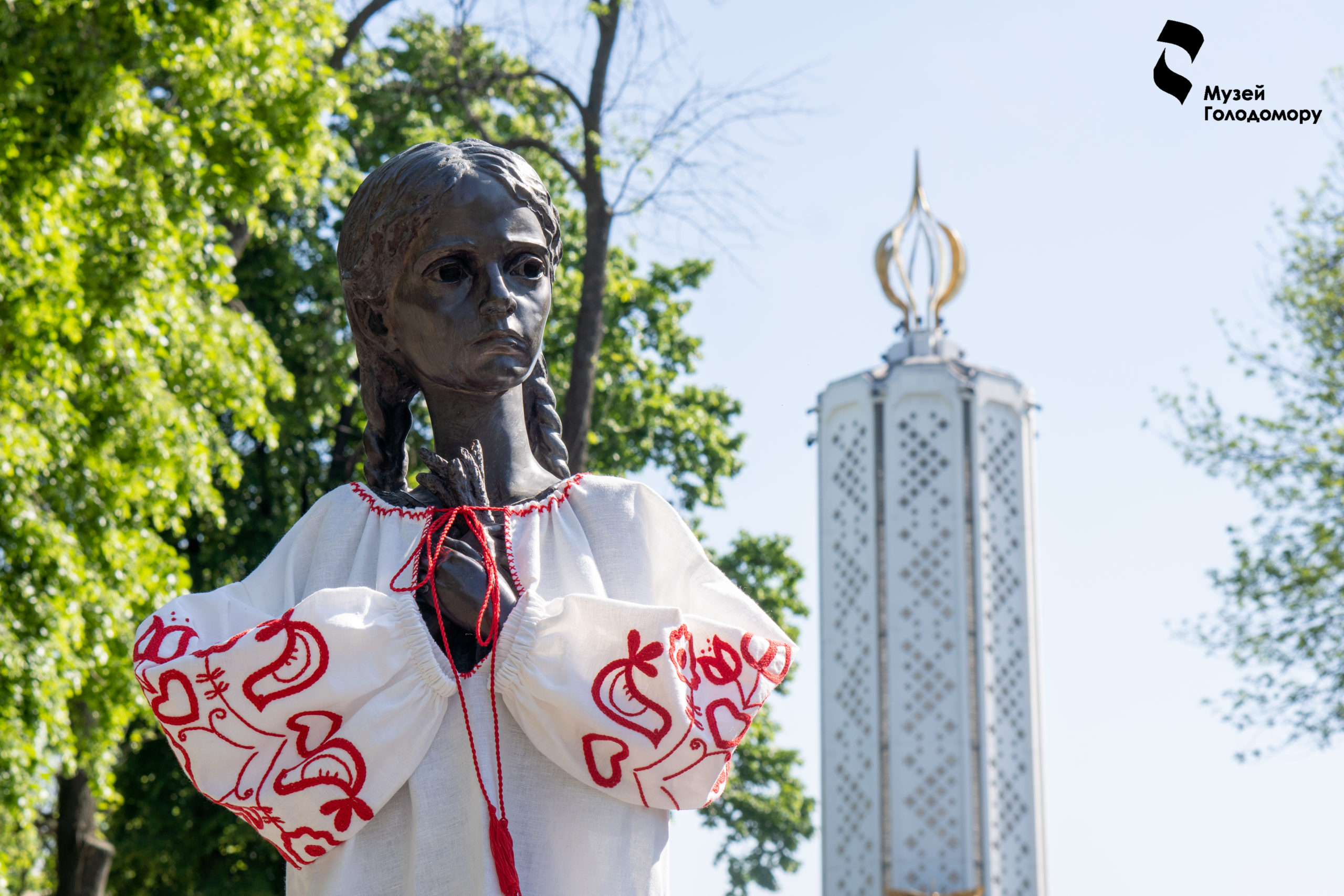The Holodomor Museum opened an exhibition of embroidered shirts, received new exhibits, and dressed a girl with ears of grain in an embroidered dress
Several events for the International Day of Museums and the Day of Vyshyvanka took place today at the National Museum of Holodomor-Genocide. On May 18, for the first time, the most famous monument to the Holodomor victims, “Bitter Memory of Childhood,” was dressed in an embroidered shirt.
“During the Holodomor, Ukrainian children were deprived not only of a piece of bread but also of a happy childhood – entertainment, beautiful clothes, carefree everyday life and holidays. On Vyshyvanka Day, with this symbolic action, we want to remember their lost childhood and remind everyone that even today, at this very moment, it is being stolen from modern children, depriving them of the right to safety, education, and often to life,” the organisers explain.
The shirt on the girl with ears of grain was not chosen by chance – it was sewn by the I TELL YOU ethnic clothing workshop from Irpin. In her introductory speech, the head of the initiative, Yuliia Livinska, said that their workshop teaches everyone who wants to create embroidery for themselves and their relatives, even if a person does not have specific experience and a lot of time for this. Museum representatives emphasize that, by inviting I TELL YOU, they express their support for grassroots initiatives regarding the modern revival of Ukrainian culture and initiatives that carry out their activities in de-occupied cities, contributing to the reconstruction of public life.
Simultaneously with the action near the monument, an exhibition of embroidered shirts from the collection of the Funds of the institution was opened in the Hall of Memory of the Museum. The organisers explain that most of the exhibits have a unique history. In particular, one of the most valuable is a shirt from Perekopivka, Romny district, Sumy region. Agafia Chub embroidered it in the 1920s for her wedding. The woman died suddenly in 1930. Saving two daughters during the Holodomor, Agafia’s husband exchanged all embroidered items and valuables for food. He left only the wedding shirt of his wife, who he loved very much. A few years ago, the daughter of the deceased Hanna Avramivna Omelianenko (Chub) donated a family heirloom to the Holodomor Museum.
Among the 11 shirts, you can see a modern embroidered shirt. This is a child’s shirt, which was embroidered for her grandson by a woman from the Kharkiv region. The family living in the Izium district was forced to hide Ukrainian clothes and Ukrainian symbols, fearing repressions from the invaders. Yes, a child’s embroidered shirt was buried in the ground in a jar. After the de-occupation, it was transferred to the Funds of the Holodomor Museum.
The replenishment of Funds took place directly on May 18. Just during the Museum Day and Vyshyvanka Day events, an embroidered shirt from the 1930s was handed over to our Museum, which belonged to Dmytro Nekipelov – a soldier of the Armed Forces of Ukraine, who went missing in May 2022 near Avdiivka.
“My great-grandmother Khrystyna wove and embroidered this shirt for her husband Stepan. Then the embroidery passed to his son Ilia, my grandfather, and then to his son Volodymyr, my father. My dad had no sons, so the shirt was passed on to my husband. Eventually, I decided that the family shirt should be in a museum. As a symbolic reminder of our hard history: its first owners survived the Holodomor, and 90 years later the same enemy came to destroy us again,” the donator Anna Tkach, Dmytro’s wife, says.
Eduard Krutko, a collector of antiquities from the Poltava Region and founder of the Ethnographic Collection Drevo, shared artefacts from his own collection, too. He gave the Museum an embroidered towel, saved by his grandmother Oryshka Krutko during the dekulakization of their family in the 1930s. And also another towel that belonged to Khrystia Denysenko’s family, who saved the family of Oryshka Krutko after the dekulakization. Mrs Khrystia secretly helped her neighbour and her five children with food, risking putting herself in danger because it was forbidden to help the dekulakized.
In case of additional questions: (044) 254-45-12
